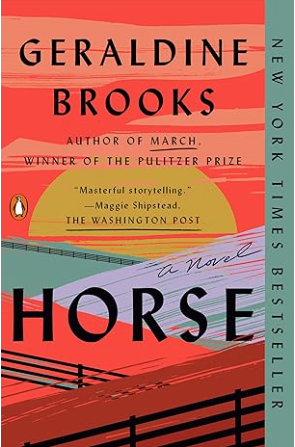
I started asking for a horse in the third grade. My parents, wary of what might be a passing fancy, wisely refused. As I grew older and persisted in my horse-crazy ways, my parents compromised by letting me lease a horse in the summers of my middle school years. When I really wouldn’t let go of the idea and proved my interest in horses was more than a childish obsession, they bought me my first horse when I was 14. All through high school I was convinced that horses were better than boys, and now thirty years later I am still an equestrian. So when I heard that Geraldine Brooks, a writer whose books I have enjoyed and admired in the past, had written a book called Horse, knew I had to read it.
Horse tells the story of Lexington, the greatest American thoroughbred race horse of the 19th century, and the people whose lives he touched, both historical and fictional. The book opens in 2019 where we are introduced to Jess, a White Australian expat employed by the Smithsonian vertebrate osteology lab (an expert on animal bones), and Theo, a Black art history PhD candidate at Georgetown University. After an accidental meeting at the Smithsonian, they realize they both have an interest in Lexington: Jess, because she has found the articulated skeleton of Lexington in an attic of the Smithsonian Museum of Natural History, and Theo, because he has stumbled into ownership of a 19th century painting of Lexington.
From here the book jumps back to Kentucky in the 1850s, and we begin the story of Jarret, the enslaved boy who cares for and trains Lexington from the horse’s birth in 1850 till his death in 1875. Brooks has pulled many of the characters from the pages of history, and weaves these historical figures throughout her fictional saga. We meet the various owners of Lexington, the abolitionist Cassius Clay, equine portraitist Thomas Scott, and Lexington’s Black trainer, Harry Lewis, a former slave who has bought his own freedom. Harry Lewis (in this story) is also the father of Jarret, and he hopes to buy Jarret out of slavery.
As Lexington and Jarret travel through Kentucky, Mississippi, Louisiana, Illinois, and New York, Jarret realizes that though born into slavery, his early years have been relatively easy at the farm of Dr. Elisha Warfield in Lexington, Kentucky. It is impossible for him to forget that he is a slave, but it is not until both Jarret and Lexington are sold farther south that Jarret realizes how lucky he has been (if anyone born into slavery can be called lucky) at the Warfield Estate. His life in the stables of the estate allowed him to work with animals he loved in an environment that sought the best for them.
In contrast, at a stopover in Mississippi, Jarret is separated from his beloved horse and forced to work as a field hand in the cotton fields. Brooks writes, “From before first light till full dark, the days were a blur of throbbing pain, agonized spirits. He had never known life could be so bitter.” But it is also during this interlude that Jarret learns to read and makes connections with other enslaved people he would not otherwise have had relationships with: “He began to watch people with the sensitive attention he’d only ever accorded his horses…. He hadn’t had thoughts like that before. Even as his world contracted and pressed in upon him, in equal measure his heart expanded.”
Eventually reunited with Lexington, Jarret continues to be reminded of his slave status, as both he and the horse are bought and sold. In Louisiana, his absorption in the training of Lexington lulls him to forget his enslavement, only to have it hit him when his current owner, Richard Ten Broeck, says to a companion, “This is Harry Lewis’s boy, whom I bought from Warfield, if you’ll recall, around the same time as we bought his horse.’” Of course, Jarret must keep his reaction to himself, but “to hear his name in this way was like a cudgel landing upon an unhealed wound. Jarret had dropped his guard these past months, living like a free man with a respected occupation. To be spoken of as livestock was bitter as a gallnut.” Despite the respect he has earned for his acumen in the care and training of race horses, Jarret still has no agency, no rights, and no freedom.
Theo in modern day Washington D.C. may not be dealing with the overt racism of slavery, but he experiences it in subtler forms in his relationship with Jess, a relationship he keeps questioning the wisdom of, but one he is not willing to end. Their acquaintanceship begins awkwardly when Jess mistakenly accuses Theo of attempting to steal her bike, and it progresses uncertainly from there, as Theo wonders whether he can ever have an authentic relationship with a White woman who doesn’t understand what it means to be Black in the modern world..
As the book toggles between the antebellum South and 2019 Washington D.C. a recurring theme for both Theo and Jarret is the burden of trying to explain their oppression to their white counterparts. Jarrett is prevented from speaking because of his position; Theo, because of his good manners. Both are galled at the ignorance and naivete of the White people in their lives, people who don’t understand that their mere presence poses a threat to Theo’s and Jarret’s lives.
In Horse, Brooks expertly weaves a love story–love for horses and love between people–with a story about racism. Both Jarret and Theo find much of their lives defined by the color of their skin, but they refuse to give in to despair or cynicism. They show strength and resilience despite their vulnerability to the whims and prejudices of others. Even in the face of uncertainty and injustice they continue to fight for the good in their lives. As a fellow rider, I can see how the shared love of horses for so many of the characters in Horse is a source of strength and comfort, just as it has been in my life.


9 Responses
Thanks Mindy for this fine review of a book that I loved.
How wonderful your words and thoughts are, Mindy. I appreciated this very much.
Thanks, Mindy, for an excellent review of this book. I well remember your early love for horses, and I am glad to hear that it has never left you. Blessings and best wishes from Lee and me.
Our book club discussed Horse last year. It’s a rich novel. I recommend it for consideration by all book clubs.
Mindy, I will buy the book and read it because of your fine review and Hugh Cook’s recommendation.
So clear and crisp. Beautifully written. Thank you.
Thank you, Mindy.
You write and express yourself beautifully! Thank you for sharing with this community. I look forward to reading the book. Your writing entices me to do so!
It’s great to see you in print, Mindy!!! Excellent review! Have you read Brooks’ new Memorial Days? A memoir of losing her husband. Very different genre but also excellent.
Thank you for reminding me of the complexities of this rich book. Now, it seems, it’s due for another read through.